Lieutenant Sergei Shpakovsky battlefield did not leave
The capture of bridgeheads in the area of the Dnieper River was conducted by the Soviet command in several directions. But the battle in the village Soshinovka has become one of the most difficult and dramatic.
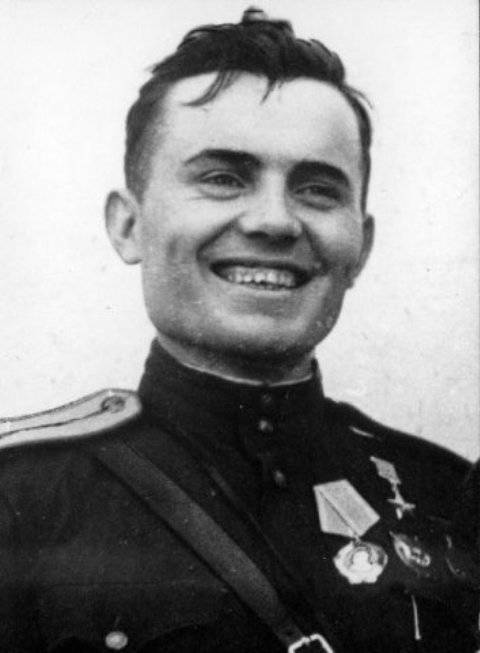 The inaccessibility of the Eastern Wall, which the retreating fascists had created all over the Dnieper, was learned not only from leaflets scattered by fascist planes, but also from prisoners. One of them, captured by the scouts, told only about the order of Hitler, which they read to the line: German soldiers were ordered to fight at any cost. No valuable information from the prisoner could not be obtained.
The inaccessibility of the Eastern Wall, which the retreating fascists had created all over the Dnieper, was learned not only from leaflets scattered by fascist planes, but also from prisoners. One of them, captured by the scouts, told only about the order of Hitler, which they read to the line: German soldiers were ordered to fight at any cost. No valuable information from the prisoner could not be obtained.And the headquarters needed to find out what forces the enemy has on the other side, where the emplacements are located, how many are there. The troops of the South-Western and Steppe Fronts were on the way. Parts of the army of the Steppe Front were already digging in the floodplain of the Dnieper River: the soldiers looked with hatred on the opposite bank.
For two months, the Germans turned the right bank into a large fortified area. Nature itself helped the Germans: the right bank in relation to the left was much higher.
In the evening, the division commander, Ivan Ivanovich Fesin, summoned all the intelligence officers and set a combat mission: to conduct reconnaissance of the enemy troops stationed on the opposite bank. The commander ordered the failure of those who want to volunteer.
The commander of the third platoon of the 496 separate reconnaissance company, Lieutenant Sergey Petrovich Shpakovsky, stepped forward:
- Allow our platoon to perform a combat mission!
As soon as the dusk fell, 25 September 1943, the scouts left in two regimental carts towards the river.
The commander of the Steppe Front, Army General Ivan Stepanovich Konev, understood that the enemy was exhausted by the battles, he could not be given a chance to strengthen his positions. Therefore, already on the way, the scouts "caught up" with the order: to capture and keep a small bridgehead near the village of Soshinovka.
The scouts were lucky from the very beginning: they quietly crossed over to the right bank, saw a ravine and ran there. Lurked. German patrols were walking along the cliff along the cliffs: they could hear their barking speech. They passed by.
Private Konstantin Fedorovich Zaitsev knew German and was able to understand from the fragments of the conversation what the Germans were talking about:
“They have a battery here,” he translated. - The sentry called for another to go to the guardhouse and warm up with schnapps.
Scouts lucky one more time. The Nazis gave out the layout of their calculation: unexpectedly, at the very edge of the forest, a German machine gun began to fire. The platoon commander Shpakovsky sent a detachment of Stasyuk to bypass, and he himself, shouting: "Guys, go ahead!", Ran towards the firing machine gun, clinging to the ravine. In a few jerks, the scouts reached the parapet, beyond which could be seen a dugout covered with logs, an embrasure reel, and the silhouettes of guns. The scouts destroyed the German settlement in a matter of minutes.
A mile and a half on the hill were visible contours of the roofs of the village Soshinovka. Now on the site of this village is a reservoir. The Germans, hearing the shots on the shore, opened fire. Scouts made their way to the village in short dashes, clinging to the ground. Bullets whistled overhead.
None of the scouts did not know what forces the enemy had in the village.
The fighters of the department Vasily Dmitrievich Stasyuk broke into the outskirts of the village. "Comrade Stasyuk destroyed the German 9 with fire and a grenade in the hand-to-hand combat, - the award list says. - Comrade Stasyuk’s squad in a fierce battle skillfully dispersed and partly destroyed his soldiers and officers before 50. Comrade Stasyuk during the battle was always ahead of his fighters offices and personal example inspired them to exploits. Acting suddenly and decisively, Comrade Stasyuk did not allow the enemy to come to his senses, destroyed him and, moving forward, won a bridgehead for the landing of the avant-garde division. "
This is how the heroes' feat is described in award documents. But in 1985, the Donbass Publishing House publishes the book “Legends that Have Become a Legend”. Briefly, it describes something like the following.
From the attic of the last house unexpectedly slashed the machine-gun fire. Vasily saw six of his machine-gunners fall. Stasyuk threw a grenade, then the second - the German machine gun was silent. But between the huts, chains of German machine gunners grew out of a curtain of dust and smoke. Under the cover of machine guns and cannon batteries, the Nazis rose to attack more and more resolutely.
- Do not take us Soshinovka themselves, - said Lieutenant Sergey Shpakovsky. - We must retreat back to the battery and keep the defense there. Do not leave the wounded.
Scouts retreated. "Lieutenant wounded!" - Stasiuk heard someone scream. And then Vasily assumed command of himself:
- Platoon, listen to my team!
Short dashes, from tree to trench, along the ravine led the soldiers to the shelter of the newly occupied battery. Along the way, hastily picked up the wounded. Among them was Lieutenant Sergei Shpakovsky.
“Hold on, petty officer, to the last bullet,” he said goodbye. And the men carried him on a cape down to the river.
On this we put an end. And we will not search for those who needed in the book to present a completely different version of events. Referring to the official archives. As it turned out, in the award documents it says exactly the opposite. First, Lieutenant Sergei Shpakovsky did not leave the battlefield. Second, the scouts still took the Soshinovka.
"Lieutenant Shpakovsky with a platoon of reconnaissance 26 on September 1943 of the year on 2.00 was the first to force the Dnieper in the direction of the village of Soshinovka. On the northern outskirts of the village of Soshinovka, a platoon was engaged in a battle with the coastal posts of the enemy.
Military guard in this battle was destroyed. With his bold actions, a platoon under the command of Lieutenant Shpakovsky made a panic among the enemy, and provided a ferry for the units of the 509 Infantry Regiment. The reconnaissance group of scouts fought for three hours.
In this battle, Lieutenant Shpakovsky was wounded in his left hand, but continued to command a platoon, "said Ivan Ivanovich Fesin, commander of the 236 rifle division, in the award list.
The hardest thing started the next day.
Vasily Dmitrievich Stasyuk’s award list tells us that “by the day of 26.09.43, the enemy repeatedly attacked the scouts with large forces. Comrade Stasyuk skillfully organized the fire of his squad, inflicted heavy losses on the enemy, repulsed all his attacks, defending the conquered milestone. In subsequent battles, Comrade Stasyuk repeatedly performed the most difficult tasks of command. With honor from performed and delivered valuable data. For the displayed heroism, courage and fearlessness, for the skillful talent carried out reconnaissance operations in the battles for capture and oud neighing of a bridgehead on the right bank of the Dnieper River deserves assignment of the Hero of the Soviet Union. "
Why the researchers of the intelligence mission did not fully figure out and published data in their book that did not correspond to reality is a big question. After all, the fact that Stasyuk took command of himself, in the award documents said nothing.
In the award list of one of the scouts, they described in detail how they fought for the bridgehead: "Comrade Lev Alexandrovich Gitman participated in forcing the Dnieper River in the Soshinovka area on the night from 25 to 26 of September 1943. Comrade Gitman was the first to break into the 19 reconnaissance team. on the right bank of the Dnieper. During the whole night, he fought a fierce battle with the battalion of the enemy’s infantry. Through his heroic actions, he contributed greatly to the success of the whole group’s actions. Comrade Gitman was the first to rush into the enemy’s battery, fire and dispersed and destroyed her calculations with grenades and captured the enemy’s machine gun, from which he fired at the fleeing Germans. In a night battle, Comrade Gitman killed eight Germans. In one of the fierce battles on the streets of the Soshinovka village, Comrade Gitman was wounded. "
By the way, some researchers of the feat of intelligence today eliminate the name of Gitman from the list of recipients and publish a list of 32 names. While the high award received 33 man. Among those awarded are practically the entire reconnaissance platoon commanded by Sergei Shpakovsky.
The courageous actions of the scouts allowed the battalion of the 509 Infantry Regiment under the command of Captain Ivan Grigorievich Grishin to successfully cross over and fight on their own, albeit small, territory. Thus, the Aulsky bridgehead was created (named after the village of Aula, located near the village of Soshinovka). In a week and a half, units of the Steppe Front increased the area of the Aul bridgehead from one to 35 kilometers.
On photo:
1. Monument in honor of the fallen on the Aul bridgehead in 1943 year.
2. Lieutenant Sergey Shpakovsky.
3. Award documents.
Decree of the Presidium of the Supreme Soviet of the USSR of November 1 1943 of the year
On assignment of the title of Hero of the Soviet Union to generals, officers, sergeants and soldiers of the Red Army.
For successfully crossing the Dnieper River, firmly consolidating the bridgehead on the west bank of the Dnieper River and showing courage and heroism while granting the title Hero of the Soviet Union with the award of the Order of Lenin and the Gold Star medal:
1. Krasnoarmeytsu ALIEV Gus Agasevich
2. The corporal BOYCHENKO Viktor Kuzmich
3. Senior Lieutenant VLASOV Peter Dmitrievich
4. Krasnoarmeitsu Hitman Lev Alexandrovich
5. Lieutenant-General Vasilyevich GLAGOLEV
6. Krasnoarmeitsu GROSHENKOV Peter Pavlovich
7. Senior Sergeant GUZYU Mark Dmitrievich
8. Krasnoarmeitsu Degtyarev Alexander Ilyich
9. Krasnoarmeitsu DENISYUK Fedor Ignatievich
10. Senior Lieutenant George Alekseevich EVSTAFYEV
11. Krasnoarmeitsu ZAYTSEV Konstantin Fedorovich
12. Guard senior sergeant KISELEV Sergey Semenovich
13. Sergeant KONDYREV Vasily Ivanovich
14. To Captain KRAVCHENKO Vasily Ivanovich
15. Colonel Peter Ivanovich KULIZHSKY
16. Lieutenant Colonel Konstantin LEBEDEV
17. Krasnoarmeytsu LyAh Daniil Panteleevich
18. Junior sergeant Nikolay Nikolayevich MARKOV
19. Lieutenant Murdyan Andrei Akopovich
20. Colonel ORLOV Ivan Mikhailovich
21. Krasnoarmeitsu PUZYREV Sergey Mikhailovich
22. To captain RUSINISKY Veniamin Abramovich
23. Sergeant SABANOV Grigory Gerasimovich
24. Senior STASYUK Vasily Dmitrievich
25. Guard captain TAKMIN Ivan Klimentevich
26. To captain TATYANOV Mikhail Ivanovich
27. Politruk Tikhomirov Ivan Nikolayevich
28. Sergeant FEDIN Fedor Denisovich
29. Senior HAZARIAN Semen Arkadyevich
30. Senior Sergeant Chmirenko Nikolay Romanovich
31. Krasnoarmeitsu SHILOVSKY Leonid Prokofyevich
32. Lieutenant SPPAKOVSKY Sergey Petrovich
33. Captain UNINU Ivan Mikhailovich
Chairman of the Presidium of the Supreme Soviet of the USSR M. Kalinin,
Secretary of the Presidium of the Supreme Soviet of the USSR A. Gorkin,
Moscow Kremlin
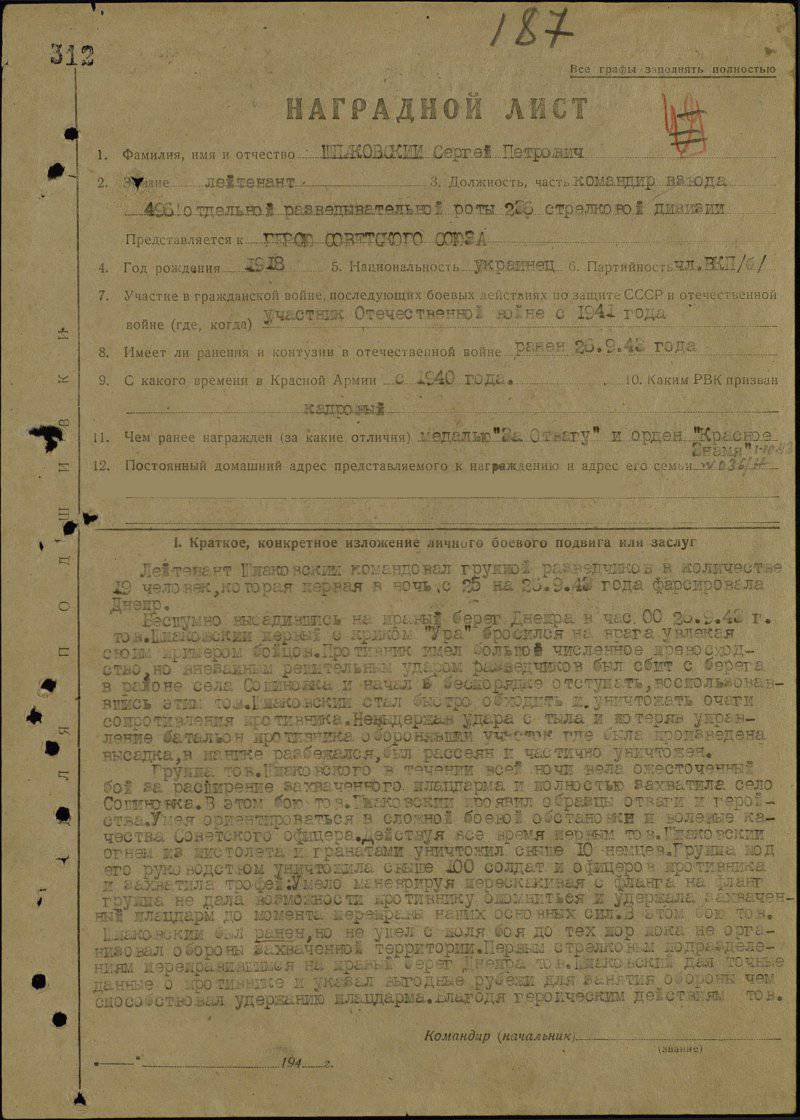
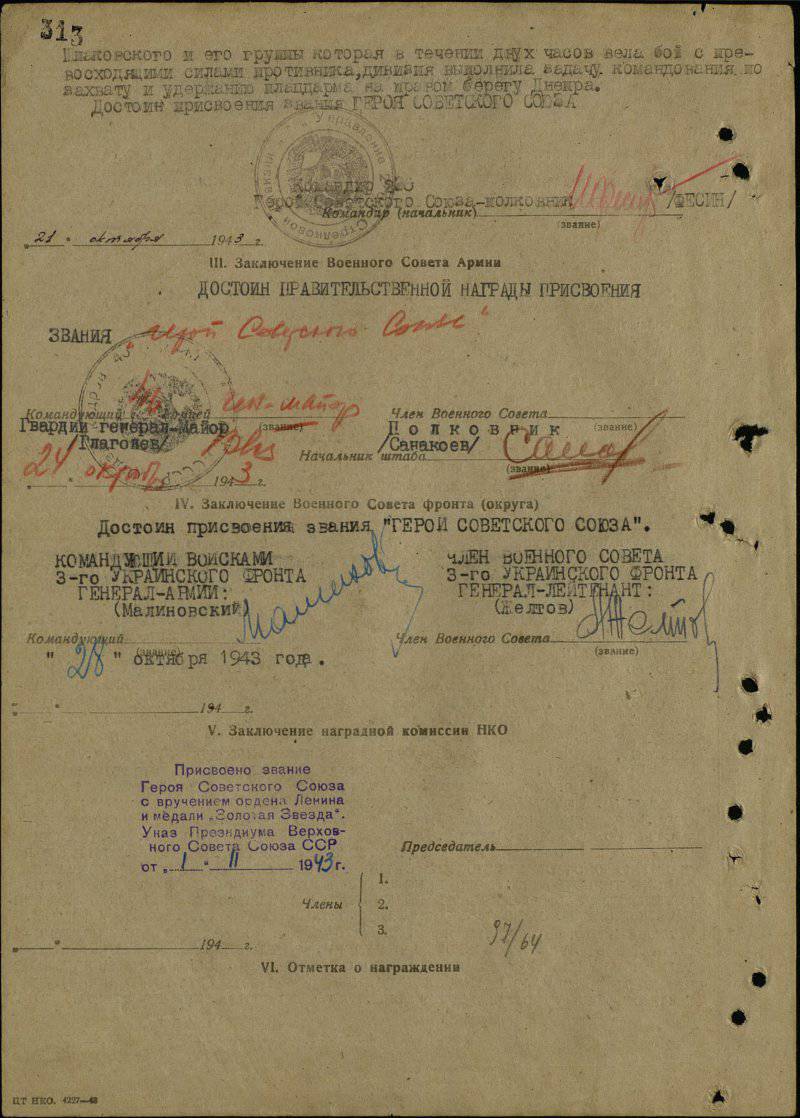
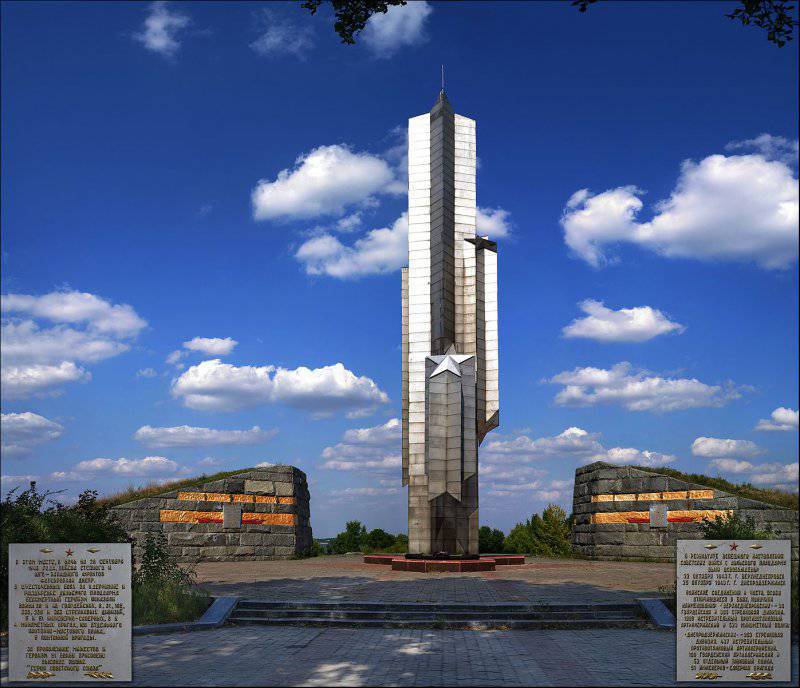
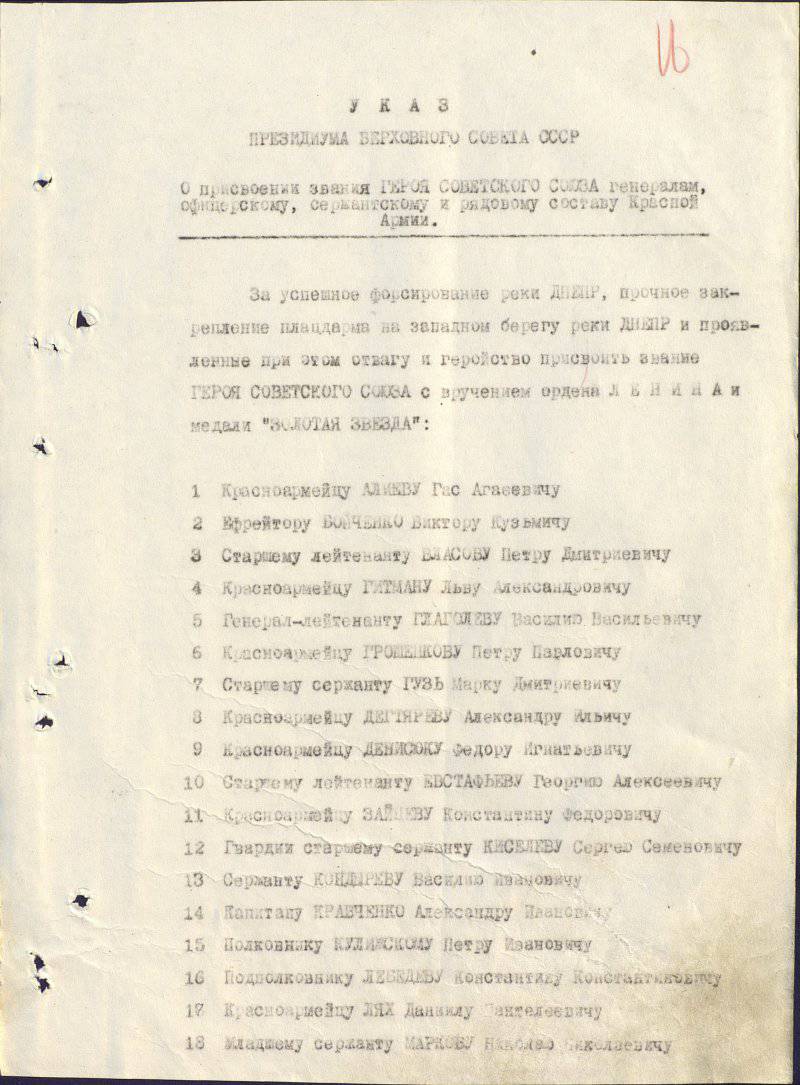
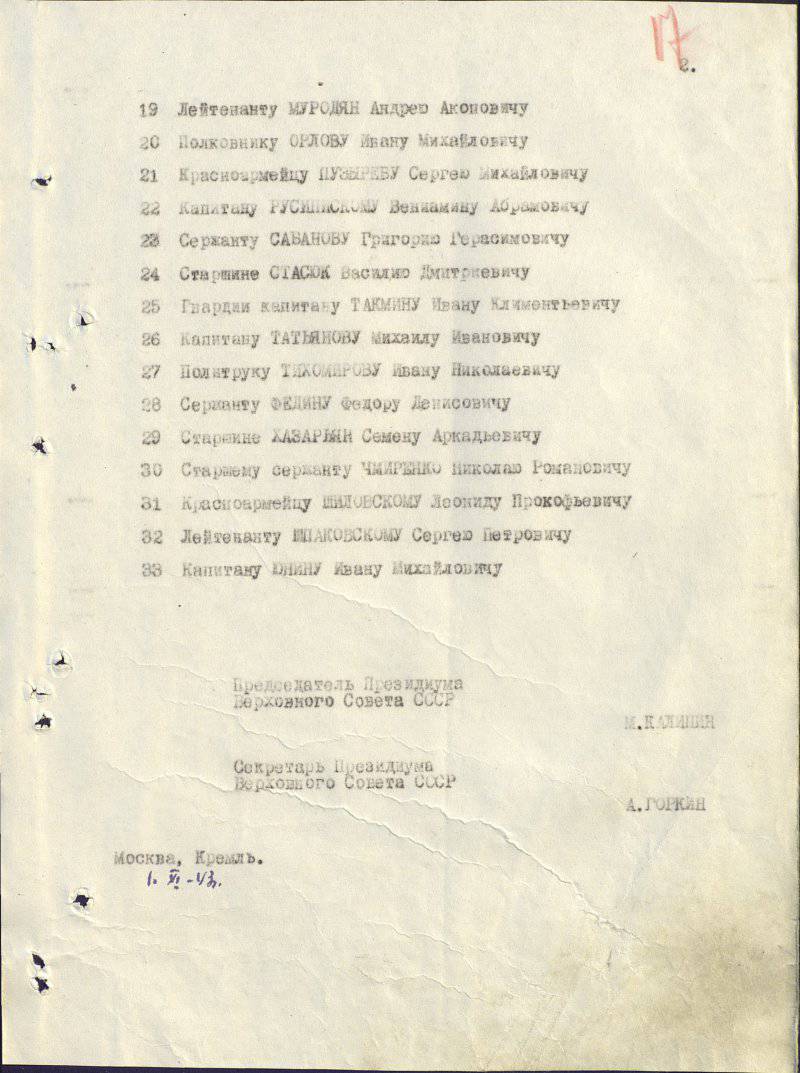
Information